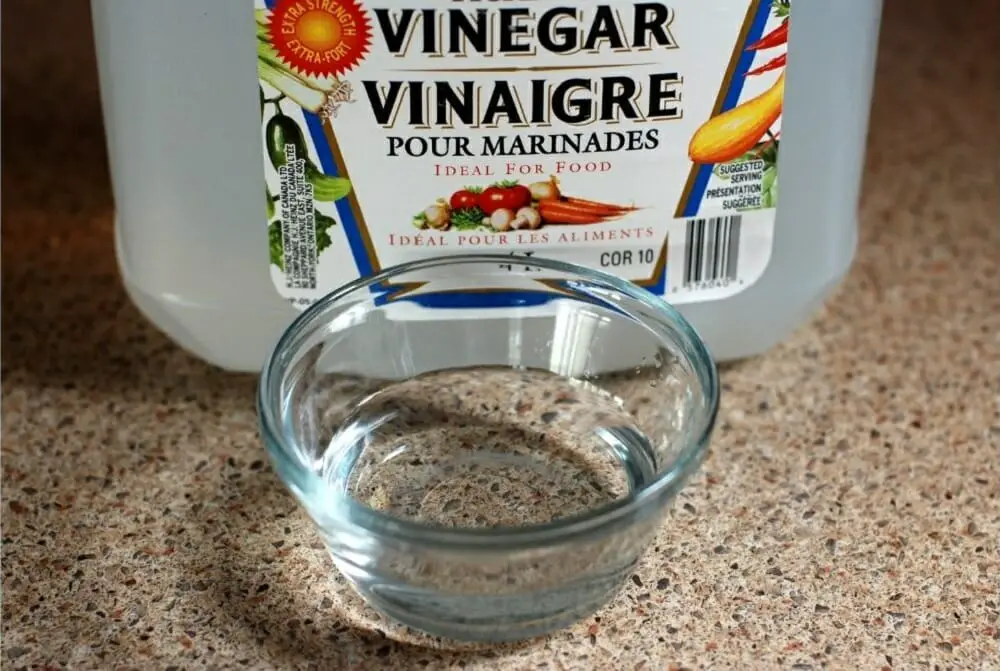It’s fair to say vinegar is something most of us keep in our homes. It is a versatile substance with many uses and lots of different flavors.
Some of us choose to have it on our food, enjoying it on tasty fish and chips, while others use it as a natural way to clean kitchen surfaces and floors.
Some people even like to drink some types of vinegar. It seems like a pretty good thing to have around the house but is it really a good idea to? Vinegar is after all an acidic liquid containing alcohol.
The strong potent smell of vinegar and its ingredients has led to many people asking questions. One of those questions is whether or not vinegar is flammable.
With vinegar containing alcohol, it’s not hard to see why people want to know if it’s flammable and if it could potentially catch fire.
Luckily despite its strong smell and ingredients vinegar isn’t flammable and won’t catch fire, so don’t worry you haven’t been adding fuel to your dinner or your cleaning cupboard. If you want to know why vinegar isn’t flammable be sure to read on.
In this article, we will be looking at what vinegar is made from, the different types you can buy, and why it isn’t flammable.

What is Vinegar?
Vinegar is an acidic liquid created by fermentation. It is used for cooking thanks to its strong flavors and also for cleaning thanks to its chemical properties. Humans have been producing vinegar since at least 3,000BC so we can confidently say we’re getting good at it. Vinegar is made by mixing acetic acid and water together. Acetic acid is produced by letting wine or beer stand for long periods of time.
When the vinegar has finished fermenting it usually consists of 5-20% acetic acid. The rest is mainly water unless a chemical has been added to give the vinegar color or flavor. Flavorings and colorings are normally added as phenolic acids, flavonoids, and aldehydes depending on the type of vinegar being produced.
As you can see from the information above acetic acid is one of the key ingredients in the production of vinegar. This ingredient is a highly flammable substance so you can see why people get confused over the possibility of their vinegar catching fire. There is no reason to be concerned though.
What is acetic acid?
Also referred to as ethanoic acid, acetic acid is a potent chemical compound. In regards to vinegar, it is the compound that gives it the tangy and acidic taste we are all familiar with. The colorless compound is also a crucial agent for a lot of other products and chemical processes. It is in cellulose acetate which is used in photographic film and polyvinyl acetate which is often found in wood glue.
In its pure form, the chemical compound can be very dangerous because as we have said it is highly flammable. However, when mixed into other liquids or used in other chemical processes acetic acid becomes a lot less dangerous.
Why isn’t acetic acid flammable in vinegar?
Acetic acid isn’t flammable in vinegar because there is such a low percentage of it present when compared to the main ingredient which is water. Most vinegar only contains 5-8% acetic acid and 92-95% water. From this you can clearly see that the balance of non-flammable ingredients heavily outweighs the acetic acid, making the vinegar perfectly safe to have around heat or a flame.
It is as a result of this that we can confidently say that vinegar is not flammable. Vinegar could only ever be flammable if it was nearly 100% made out of acetic acid which it isn’t, and besides if it was we wouldn’t want it anyway.
Can vinegar catch fire?
A typical vinegar found in your household whether it be for cooking or cleaning will not catch fire. As we mentioned above it isn’t flammable because the flammable compound in the vinegar is diluted by the high percentage of water. This makes it lose its flammable properties.
Of course, if you were to heat the vinegar up to a temperature where the water evaporated leaving just the acetic acid then you could technically make the vinegar flammable and let it catch on fire but that would be very difficult and a very clever thing to do. Acetic acid has a flashpoint of 104°F. This means you would have to isolate the acetic acid in its pure form before reaching this temperature to set it on fire. It would be ridiculous to do so. It is also worth noting that this could never happen accidentally because you will never have a need to heat vinegar up like that.

Are other types of vinegar flammable?
Like normal cooking vinegar, other types of vinegar can’t catch fire. Here are some of those types of vinegar.
Apple Cider Vinegar
Apple cider vinegar has a great reputation for having great health benefits but it is simply no different chemically from any other type of vinegar. Being made with mainly water too makes it another non-flammable vinegar.
Cleaning Vinegar
Weirdly for those of us who like vinegar on our food, cleaning vinegar is very similar to cooking vinegar. The only real difference between the two is that cleaning vinegar usually contains more acidic compounds. This vinegar typically contains 6% acetic acid unlike cooking vinegar that contains 5%. The reason for this is because with more acetic acid the vinegar is better at removing bacteria and cleaning dirty marks.
What would happen if vinegar came into contact with a fire?
As vinegar isn’t flammable there isn’t too much to worry about if it comes into contact with a flame. It would be very difficult for vinegar to catch fire because a fire would struggle to get hot enough to break down the main ingredients that would leave the acetic acid on its own.
Even if the worst-case scenario did happen and the water evaporated, there would be little to no acetic acid left anyway so a vinegar fire would still be pretty impossible. It would take very controlled scenarios with insane heat and the perfect type of vinegar for it to burn, which is very very unlikely.
Are the fumes from vinegar bad for you?
Whilst we’re on the topic of vinegar let’s tackle another interesting point of confusion. Some people are under the impression that the fumes from vinegar are unsafe to inhale, potentially causing some health implications.
In general, vinegar fumes are safe to inhale, if the amount is only small. If you can help it you shouldn’t inhale vinegar fumes for a prolonged period of time or in big quantities. It is perfectly safe to do so when going about your daily usage in the kitchen or while cleaning your house. This is because the fumes simply aren’t that strong, aren’t concentrated that much, and most importantly aren’t toxic.
However, if you were to inhale a large amount of highly concentrated vinegar for a long period of time you could potentially be negatively affected. Having said this you would only encounter this in extreme situations where the fumes deprived you of the vital oxygen the body needs to function.
Takeaway
Vinegar is a hugely popular substance used by people for the last 5,000 years. It is a great addition to any kitchen or cleaning cupboard, making food taste extra good and cleaning the toughest of surfaces. Although it contains highly flammable acetic acid, vinegar isn’t flammable and won’t catch fire.
The reason for this is because of the very low acetic acid content levels found in vinegar. With just 5-6% of acetic acid and 92-95% water, the flammable properties of the acid are eradicated making vinegar perfectly safe to be kept around the home and when heated up during cooking.
It is still worth noting that even though it isn’t flammable you should still take care when cooking with vinegar. Similar to when you cook other substances and liquids you should always cook safely and be aware of the dangers. Vinegar might not catch fire but it can still get very hot so make sure you don’t burn yourself.








